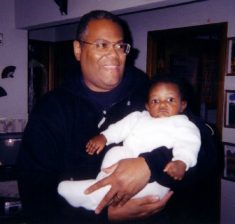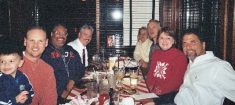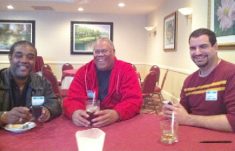Why White People Don’t Understand Racism And What They Can Do About It
Posted by Mitch Mitchell on Jun 3, 2020
Tough title; I know. It needed to be because I need everyone's attention as I tell a couple of tales and then try my best to offer a little bit of advice to those who say "I'm not racist", "I don't see color", or "I don't know what to do to help"... or something along those lines.
 |
Truth be told, in many ways I've been lucky throughout most of my business life and career. I've suffered few direct racial slights, luckily because I was good at what I did. Yet, I didn't get out unscathed, and even now, as a consultant, it's harder for me to get individual contracts than my non-black consultants.
Can I prove it? Directly, no. But let's face the fact that if any other person could show how they helped a hospital increase their revenue in one year by $730 million in gross revenue, they'd probably have the phone ringing off the hook. Yet, Google Analytics shows that after my bio page is visited, traffic for all other pages drops off significantly; interesting, isn't it?
I was going to tell 3 tales of incidences I've endured that would highlight what minorities go through in a majority white managed business environment, then decided that would end up being 5,000 words or more to tell them properly. Instead, I'm going to tell one particular story and I'm going to name the organization, the situation, and the takeaway.
For many years I was the president of a local organization called the Mid York Medical Management Association. We were affiliated with a national organization called AAHAM. We held meetings once a quarter, which was down from 10 months a year, because things had changed, and at a certain point it was hard getting new presenters for the meetings.
Every once in a while we'd have joint meetings with the local chapter of another health care organization called HFMA. I was a paid member of that group as well, both when I was an employee and afterwards as a consultant. I didn't know all of them as well as I knew the members of my group, but I knew all the leaders and other members I'd see from time to time.
In 2008, I'd been a member of HFMA for about 11 years, seven of those years as a consultant. I was the only black member of the group, but I was used to that as I was also the only black member of my local medical billing group by this time. As a matter of fact, I was, and still am, either the only black person, the only minority, or one of only a few black or minority people in leadership or consulting everywhere. That's the life of being a black consultant.
 |
The group had decided to hold an evening networking event at a local bar/restaurant called Coleman's. I knew the area and I'd eaten at the restaurant (I was there the day O.J. Simpson popped up on the TV in the Bronco, which interrupted the NY Knicks game), so I figured it would be a nice way to get to know some of the members better.
I showed up dressed in a suit and tie. I know it was an after hours event, but not knowing the members as well as I might in other situations, I wanted to make sure I came across as a professional. The event was upstairs, and I heard a lot of voices coming down as I was walking up the stairs. When I got up the stairs... half the talk in the room went silent.
There was one guy, named Tom, who I'd known for just over 20 years who greeted me. He was with 3 other men, but he and I were the only two who spoke to each other; the other 3 men didn't speak, and truthfully I couldn't tell you if they were looking at me. I'd felt this sensation before; I knew what was happening.
I let Tom get back to talking to the other men and I started walking around a bit. I could feel the shock in the room; it was palpable. I eventually made my way over to the table where the food was, grabbed a few things, then went to sit at a table with a tablecloth.
Within a couple of minutes two people joined me at the table; one was Filipino, the other was Hispanic. We were the only minorities in the room, and for the next 15 minutes, until we all decided to leave, we only spoke to each other. No one else came to the table.
A couple of times I looked up to see someone looking over, but their heads turned as soon as they saw I was looking at them. This was a professional group; some of these people had to have seen me over the years, yet they had no thought to speak to me or any of the other people at our table. We were hard to miss; if anything, whoever was the president of the local group should have stopped over to say... something!
We talked about feeling the isolation of the general group, but I was the only one who was a consultant. As we left together, I knew I was never going to be at another HFMA meeting in my life. I wasn't going to continue spending $350 a year to belong to a group that didn't want me; I don't give money to people I'm not comfortable with. I also knew that not a single person in that room would ever consider their actions as racist, bigoted, intolerant or... you pick a word. In that moment I wasn't another consultant, I wasn't a health care professional... I was a black man, and nothing else.
 |
The other tales I thought about writing in this article... all had the same thing happen at one point or another. It's not exclusive to health care; not even close. It's why I rarely go to networking meetings anymore; I feel beaten down way too often. The older I get, the less I want to play the game. It's hard work trying to convince someone of your competency when you're fighting preconceived notions of race bias. If you're being ostracized at a networking event, why would anyone think it would be easier trying to get new business with people that have the same beliefs?
I know what will be said: "I'm not like that. I treat all people the same." I'm sure everyone believes that, but recently someone I know fairly well stated "I've always said 'all lives matter' when someone said 'black lives matter', but after today I finally get it." That it takes not only the death of a black man at the hand of white cops, but one that people had to watch while a black man was killed before their very eyes for the message to get through, is disheartening. Yet, maybe it finally opens their minds to having a conversation about race in general.
At the end of this article I'm going to share a video I did days after the death of George Floyd titled 7 Ways White People Can Help Minorities Stay Safe And Grow Professionally. For now, I'm going to address understanding racism and what white people can do about it, since that's the title of the article. None of this is rocket science, and none of it is covered in the video. Simple, human stuff, easy to understand and follow if you care; if you don't, so be it.
First, if you see a minority person standing off by themselves, go say hello. No one's going to bite you or hurt you; you're safe as long as you're in a group of people. Not only is it the right thing to do, but you might actually like the person.
Second, even if you're trying to be nice and say something you believe is a compliment, and before you can stop yourself you say something like "I never think of you as 'blank'", or "You're not like other 'blank' people"... if you get a response back similar to "You should" or "how am I different than the others?", don't get upset and decide you're never talking to any minorities ever again; it happens. Take it, learn from it, and know what to do the next time you encounter someone your eyes or sensibilities perceives is different.
Third, don't be afraid to let other white people see you talking, eating, or otherwise socializing with someone who's a minority. Unless you live in an openly racist community, your reputation won't be tarnished. Think about introducing your minority friend or associate to others; the more the merrier.
Fourth, try not to say certain things to a minority person that you might think of saying to pretty much everyone else. Things like "you know what's wrong with 'you people'" when you mean someone in a certain profession, but the person you're saying it to is part of a certain minority group (that's happened to me a few times), following it up with "I'm not racist". Own up to your mistake, apologize, learn from it and move on.
Fifth... if you're not interested in trying to learn how not to be a racist or a bigot or any other terms you might employ, stop trying to hide it. True, you might lose business or friends or associates, but you'll be honest and authentic, and you'll find your audience like all the other racists and bigots and whatever. Why should you try hiding what you are if people with a different skin color can't hide what they are?
The biggest shocks and disappointments I've ever had were from people I thought were one thing and turned out to be something else. Then again, based on what I've seen in spaces like LinkedIn lately, fewer people are hiding their allegiances and beliefs anymore so this doesn't seem to be as much of a problem as it was previously.
That's all I'm sharing today. I've been angry and hurt for just over a week, and it's time to let some of that go and get back to business. I said I was closing with a video; this adds 7 more lessons to what I've shared here. I'll close with what Maury Povich used to close his TV show with (I don't know if it's still on); "Be good to each other, America."
https://youtu.be/dd6abN5g4PI


Great article and very detailed video . Only if life had a play book .I do have a few questions .Why is it so hard for other races to admit that there is racism in this country ? You stated #5 .Do not try to turn minorities white! It’s the other way around , White people don’t try and be Black , which they do all the time ,you see it everyday in our society . What upsets me the most is that ,mostly White people want to be Black, but they don’t want what comes with the race of begin Black in America. You talked about hair styles, Black women have to be very structured with their hair , natural hair is looked upon as nappy hair and not suitable for the the work place ,it doesn’t fit into the corporate world. Therefore, we have to straighten our hair for the first presentation. We can’t present who we really are. Remember the quote from Maya Angelo ” When someone shows you who they are, believe them the first time ” Keep doing what you’re doing continue blogging and posting about todays current affairs.
I’ll answer and address these in order.
It’s hard for the majority, not all other races, to admit to racism because they don’t see it; it never happens to them. One might say “A black man did this to me”, but that’s not racism; one person can’t compare to a group of people all across the country.
Second issue, do white people want to be black? Truthfully I don’t think so; they want to be as “cool” as they think some black people are. Tanning, music, dance, clothes, athletics… that’s the cool visual of being black without the rest of it. Still, I don’t have a big problem with that because that part doesn’t impede getting jobs, not getting killed by the police, and not being ignored as if we’re not there, like I mentioned in the article.
Third issue, I mentioned the hair part in the video. I remember years ago on Oprah when she had Loral Langemeyer working with a black family on their finances. They came back to the show and Loral indicated that they had a major disagreement when it came to hair, and she had to learn a bunch of lessons on why black women’s hair is different than white women’s hair and how it never occurred to her. Many white women have difficulties with their hair as well, but they don’t often think that not only is it as complicated for black women, it takes a lot more chemicals and steps sometimes to get it looking a certain way. I’m not sure how to change that part of life, but my hope is that if things change in one area, at least an understanding of how things are different in other areas will come around. I have to have hope, even if it’s minimal.
Thanks for the comment!
Thanks for this, Mitch. I spent so many years in oblivion regarding racist matters, thinking that if I didn’t use bad words or allow someone to do something overt without calling them on it that I was doing my job. My parents did a good job of leading us and guiding us in the right direction, but their awareness had its limitations. In my later years I have read many books and taken classes on”White privilege” and acknowledgment of the small ways racism is with us. It is so normal, it’s appalling. I live in an area that was a hotbed of the KKK (unknown to me) still in the late 50s, and I was surprised to hear how historically (which carries over to the present in actuality) Oregon was one of the worst states. 67% of my county voted for “he who shall not be named”. I am constantly reminded that I did not know the history of black America. It was never in our school curriculum – still isn’t. I will keep trying until I die to be aware. I hope that as a country, we make it, but I have grave doubts. After all, it was built on inustice and equity.
I also have grave doubts, but I realize the only thing I can do is talk and write about it. I’m not a visible protester; I’d have to be surrounded by crowds of people, and that’s out of my comfort zone. Thanks for reading it, as always.
Sorry I can’t do and being more.